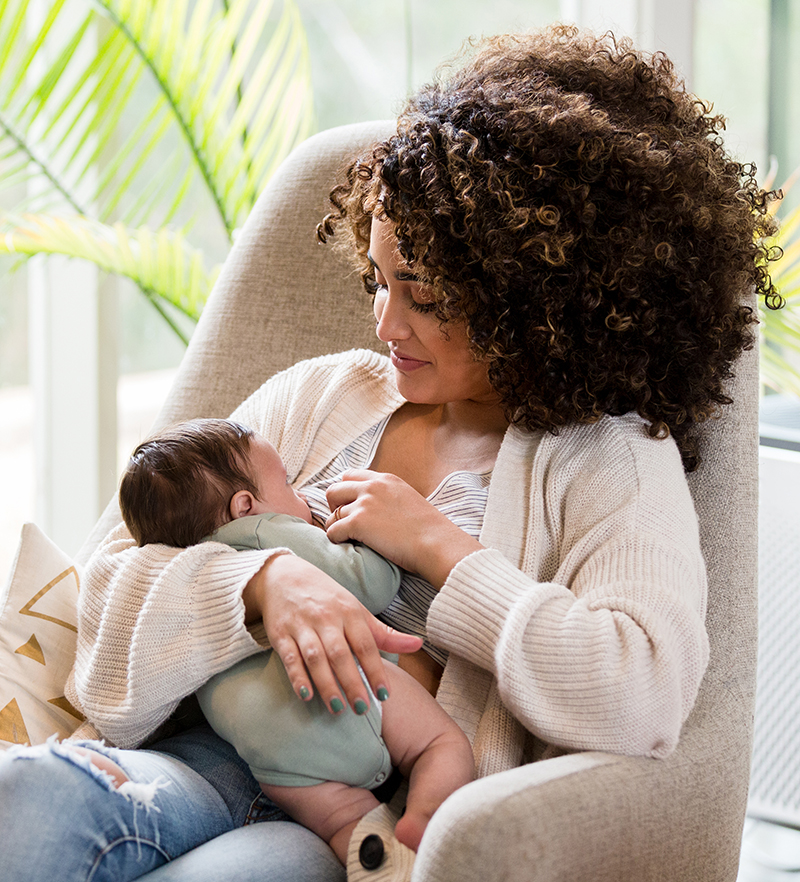
Advising pregnant women and new parents
The first part of the journey is conception; for some women this happens quickly, but for others it can take longer. Out of every 100 couples trying to conceive, between 80 and 90 will get pregnant within one year; the rest will take longer, or may need help to conceive.1
Women are most likely to get pregnant if they have sex within a day or so of ovulation (releasing an egg from the ovary); this is when they are most fertile. Ovulation usually occurs about 14 days after the first day of a woman’s last period if she has a 28-day cycle. Some women may have shorter or longer cycles or irregular periods which can make working out when they ovulate a bit trickier.2
An ovulation test can help predict when a woman is most likely to be fertile; they detect the rise in luteinising hormone (LH), which occurs just before ovulation.2
A healthy balanced diet is a key part of a healthy lifestyle and this is especially important when a woman is pregnant or planning a pregnancy. Women should be advised to take a daily 400 mcg supplement of folic acid while trying to become pregnant and until they are 12 weeks pregnant. Folic acid reduces the risk of the baby having a neural tube defect such as spina bifida.3
The Department of Health and Social Care also advises women to consider taking a daily 10 mcg vitamin D supplement, especially during the autumn and winter months. Women should be advised not to take high dose multivitamin supplements, cod liver oil or any supplements containing vitamin A while pregnant as too much can harm the baby.4 Always check the label to be sure that a supplement is suitable for taking in pregnancy. Discuss with your pharmacist when to refer pregnant or breastfeeding women to them.
The Chief Medical Officers for the UK recommend that if women are pregnant or planning a pregnancy, the safest approach is not to drink alcohol at all; drinking large amounts of alcohol during pregnancy increases the risk of long-term harm to the baby.5
For women who have a regular monthly menstrual cycle, the earliest and most reliable sign of pregnancy is a missed period. Other early signs and symptoms include:6
- Feeling nauseous or sick
- Feeling tired and emotional
- Breasts may become larger and/or feel tender
- Strange tastes, smells and cravings.
If a woman thinks she might be pregnant, she can confirm this by using a pregnancy test. Pregnancy tests detect the hormone human chorionic gonadotrophin (hCG), which the body starts producing about six days after conception. Pregnancy tests are most reliable from the first day of a woman’s missed period, although some tests can be used as early as four or five days before their period is due. When recommending a pregnancy test, always check the packaging to find out how early it can be used.7,8
Common pregnancy-related conditions
Hormonal changes and the growing baby can cause women to experience some conditions during their pregnancy that they may ask for advice about.9 Use the table below to think about the advice and support you and your team can give pregnant women.
Condition |
Advice you can give |
Constipation |
• Drink plenty of water• Eat a diet that is high in fibre, wholegrains, fruit and vegetables• Try to gently exercise regularly• Try to avoid taking iron supplements unless recommended by a healthcare professional |
Cramp in feet or calf muscles |
• Do regular gentle exercise, particularly ankle and leg movements• Massage feet and calves |
Feeling faint |
• Get up slowly after sitting or lying down• When feeling faint while standing, sit down• When feeling faint while lying down, turn onto the side |
Feeling hot |
• Wear loose clothing made from natural fibres• Keep rooms cool |
Incontinence |
• Do regular gentle exercise including pelvic floor exercises |
Peeing a lot |
• Try not to drink fluids in the late evening to avoid needing to go to the toilet in the night• Drink plenty of caffeine-free and non-alcoholic drinks during the day |
Stretch marks |
• Some women find that massaging using certain oils or creams can help with stretch marks. However, there is limited evidence on their effectiveness |
Varicose veins (swollen and enlarged veins that usually occur on the legs and feet) |
• Avoid standing for long periods of time• If the legs are affected, try not to sit with legs crossed – sit with legs up as often as possible• Try elevating the affected area higher than the rest of the body when resting• Compression tights can help ease symptoms |
 Nutrition for babies
Nutrition for babies
Exclusive breastfeeding (breast milk only) is recommended for the first six months of a baby’s life as breast milk contains the energy, nutrients and fluid a baby needs for healthy growth and development. Breast milk also protects babies from infections and diseases and has long-term health benefits.10
Some women are unable to breastfeed, choose not to breastfeed or may choose to use a combination of formula feeding and breastfeeding. For combination feeding, you should advise parents that this should ideally be started after breastfeeding has been fully established (usually around six weeks). Breast milk or formula should be a baby’s main drink until 12 months of age. Infant formula is the only suitable alternative to breast milk for the first 12 months of a baby’s life. You can find out more in this month’s In Focus module about infant formulas.
Complementary feeding is the term preferred by most health bodies instead of weaning, as it highlights that breastfeeding can, and ideally should, continue alongside the introduction of solid foods. Solid foods can be introduced at around six months, ideally alongside breastfeeding or formula for at least the first year. To avoid the risk of choking, parents should be advised to stay with their baby while they are feeding.
Did you know?
There were 640,370 babies born in the UK in 2019; this is equivalent to, on average, 73 babies being born every hour.11
